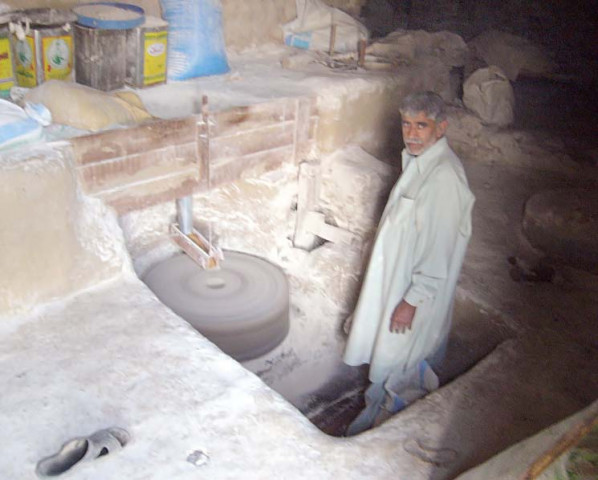Changing preferences: As water mills grind to halt, locals fear unemployment
Factory produced flour gaining demand; mill owners forced to shut down businesses.

Changing preferences: As water mills grind to halt, locals fear unemployment
The traditional method of grinding grain into flour using water mills is slowly dying due to the growing preference for factory produced flour, leaving hundreds of labourers unemployed in Haripur District.
The city of Haripur, whose name reflects the ‘Hariali’ or greenery mainly due to its orchards and agriculture, used to be known as the city of ‘Jandars’ or water mills.
Of late, only a dozen or so water mills out of a 100 are operational in the region. The rest have been forced to close down, rendering hundreds of water mill operators jobless.
There used to be about 40 water mills operational on the water of Daur River, the main source of irrigation water for the entire district. These mills fulfilled the daily wheat and maize requirements of locals, but they too have miserably failed to ensure the uninterrupted supply of flour to the local population of roughly one million, mainly due to hoarding and illegal export into Afghanistan.
However, some problems are unavoidable. The cost of maintaining water mills, a centuries old system, and decreasing water flow in the Daur River, are some of the reasons behind the slumping water mill profits. Another reason is the easy availability of flour from other sources.
Roshan Din, a local ‘jandoree’, or water mill operator, told The Express Tribune that citizens have never faced flour shortages and used to get the commodity without any hassle when there was not even a single modern flour mill in the city limits. He said that as result of flour shortage, wholesalers buy the commodity from Punjab and earn huge profits by selling it in the local market without giving a thought to how they were burdening the local consumers.
The water mill operator, whose family has been in the profession for more than five decades, also implied that the flour which is imported from Punjab or supplied by district-based flour mills is sub-standard, due to which consumers are exposed to various health risks especially, stomach diseases.
“They are openly grinding poor quality wheat and illegally contaminating the commodity with dried wheat bread without thinking about the consequences”, Roshan claimed, adding that water mills offer pure, healthy and nutritious wheat flour compared to factory-produced flour.
Sadiq Hussain, another water mill operator told that the cost of wheat flour was increasing with rising prices of electricity, gas, petrol and diesel. While this rise has directly affected the per kilogram price of flour, mill-produced flour is cheap as the cost wheat is ground in a barter system, four kgs being taken per 20 kg sack.
Built in a small 12x14 foot room with a small investment compared to flour mills that cost millions to set up, these ‘jandars’ are the source of nutritious and cheap flour with all natural ingredients like chokhar (bran), semolina (suji), maida (refined wheat flour) and atta (wheat flour).
Although the importance of water mills is vanishing as people have started to prefer faster methods of wheat grinding, Hussain, who has nine family members to support, stressed on the need to preserve this traditional method, as its extinction would heavily cost dozens of water millers their livelihood.
Published in The Express Tribune, September 9th, 2011.













COMMENTS
Comments are moderated and generally will be posted if they are on-topic and not abusive.
For more information, please see our Comments FAQ